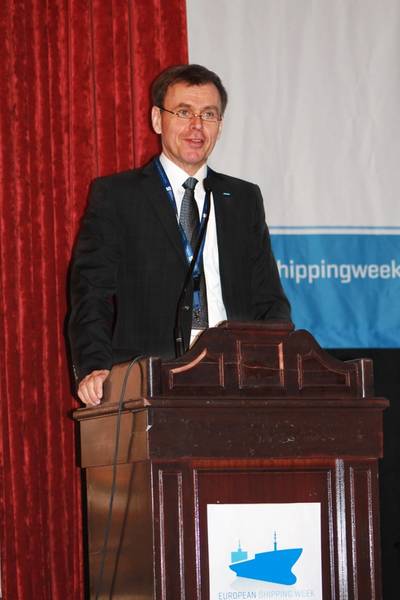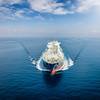Tor Svensen: Europe Must Drive Maritime Sector
Europe has a major role to play in driving the maritime industry forward, said Tor Svensen, CEO of DNV GL – Maritime, in his keynote speech on innovation at the European Shipping Week in Brussels.
Svensen outlined three priority areas that will drive shipping in the decades to come: sustainability and environmentally friendly technologies, big data and connected ship solutions as well as a new safety mindset across the whole maritime industry in order to improve its safety track record.
“Today, 70 percent of the world’s fleet is controlled from Europe. Our strong maritime clusters give us the opportunity to drive innovation – by making a continued investment in research and development, stimulating joint industry projects, focusing on building competitive strengths as well as bringing capital, academia, investors and industry together and creating industry-government partnerships. Let us use this opportunity and be thought leaders,” he emphasized.
In many of the most technology-intensive sectors of the industry Europe already lead the way, he noted. European equipment manufacturers hold a global market share of 41.5 percent – and in the fields of subsea, deep-water and technology for harsh environments European technology and know-how is world-leading. The same applied to the most advanced ship sectors, for example offshore supply vessels, passenger ships, multipurpose vessels and the new giant containerships.
The CEO of the company’s maritime business also stressed the importance of support from European policy makers. “Their commitment to shaping the framework conditions that enable the industry is critical,” he said. “We need stable and therefore sustainable conditions to let industry clusters flourish and to enhance trust. Europe needs to get the gloves off in addressing competition issues ensuring reciprocity – of course without compromising on safety and quality.”
Svensen applauded the European maritime industry for recognizing its responsibility to put shipping on a path towards greater sustainability. The role of class and the maritime regulatory system also had to keep up with the expectations of the general public. “Recently, there have been many global efforts and initiatives to protect the environment. But to achieve the ambitious goal of a 60 to 80 percent reduction in CO2 emissions there are still significant challenges that need to be addressed,” Svensen said. He noted that European industry players were working hard to tackle these challenges, by being forerunners in innovative, greener propulsion technologies, such as battery and hybrid systems, fuel cells or LNG-fuelled engines. “As the trend is to go beyond compliance, adopting these technologies gives you a competitive advantage.”
New software and big data solutions could enable the industry to implement smart maintenance strategies and increase operational efficiency. “In addition, automated systems for remote areas generate safety improvements and decision support systems can permit faster and more informed decisions by crews,” Svensen said. Apart from the use of big data solutions to improve the safety track record, the industry needed to push for greater transparency in the information exchange, learn more from reported accidents and implement preventive and mitigating barriers to the risks faced, he said.
Shipping is a vital part not only of the global economy, where it forms the backbone of all global trade, but also the internal economy of the European Union. Some three quarters of imports and exports and almost 40 percent of internal dependence on maritime transport and the so-called “blue” economy in Europe adds 500 billion euros in value and nearly five and a half million jobs. Svensen emphasized that “the European Shipping Week is a great place to highlight the maritime sector’s importance to the European economy” and thanked the European Community Shipowners’ Associations (ECSA) for its initiative to establish this event.














